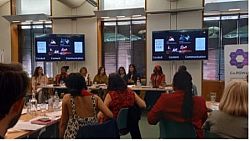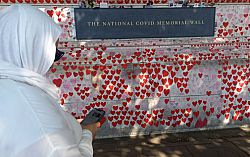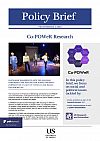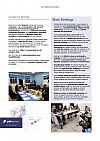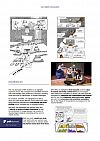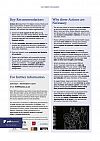Policy Brief
In the C0-POWeR policy brief, we focus on social and political issues tackled by artistic activities as part of the research process and articitic representations as part of public dissemination.
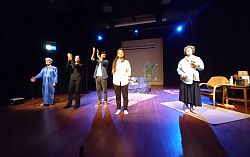
Sustaining grassroots arts for building confidence and healing for global majority communities in the light of COVID-19 and racial discimination
The Consortium on Practices of Well-being and Resilience (Co-POWeR) is an interdisciplinary, multi-partnered project on the impact of the COVID-19 pandemic on Black, Asian and Minority Ethnic (BAME*) families and communities in England and Wales.
Co-POWeR includes five Work Packages (WP) focusing on different aspects of COVID-19 impact on people’s lives: (1) emergency powers; (2) children, young people and families; (3) care, caring and carers; (4) physical activity and nutrition; and (5) use of the arts to co-create empowering narratives.
Altogether, Co-POWeR has conducted research with over 400 participants and over 1,000 survey respondents. Researchers and artists based at the University of Sussex for WP5 have channelled all the research into the arts with a focus on graphic narratives and theatre (performed and filmed).
Co-creative methods
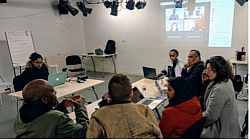
Methods included fieldwork; online and in-person workshops; ongoing consultations with research participants and Community Engagement representatives; and the use of interview transcripts, scriptwriting workshop, and participatory workshops with graphic narratives to generate stories and strategies of co-development with participants.
We also reflected on our methods through sharing work- in-progress in blogs and film clips of the final theatre play developed from the transcripts, including the documentation of audience engagement with the project themes through forum theatre debates.
We recruited individuals from Global Majority backgrounds to support the artworks as volunteers, assistants and/ or workers.

Main findings
-
Collaborative creative process in a safe space is needed to enable sharing and healing of traumatic experiences, community-building, mitigate mental health issues, and raise participants’ creative potential and self-esteem.
-
Seeing one’s own ideas come to life in the
form of illustrations, fictionalised stories and theatre characters validates the person and their experience as well as offering an opportunity to see potential solutions out of difficult circumstances. -
Anonymising and fictionalising real-life experiences and people means that participants can trust the process, raise difficult subjects to do with race and racial discrimination, and fear less individual backlash or embarrassment.
-
Availing of an effective visual or performative language to reflect on and enhance real-life issues can help to overcome barriers in literacy and linguistic competence and improve health literacy.
-
Strengthening visibility of research findings for dissemination to wider audiences means that other people can appreciate the challenges for families and communities from Black, Asian and other Global Majority backgrounds.
-
Using creative critical fora to debate key issues, such as after watching a film or theatre drama, can lead to further insights and solutions to shared problems.
-
Support structures for artistic and recreational activities need to be protected from cutbacks and available spaces bought up for private and commercial ventures so that people can engage in creative projects at a time when they are most needed.
-
Freelance artists are financially vulnerable and a lack of support has had a massive toll on opportunities, pushing many from less privileged backgrounds out of the creative industries.
Dissemination
The arts deployed in WP5 enabled us to highlight important issues that emerged from Co-POWeR research that could engage wider audiences of all ages, including those who may be linguistically- or literacy-challenged.
For instance, with WP1, we highlighted how Black, Asian and other Global Majority communities have been psychologically traumatised by over-policing and racial profiling, which increased due to lockdown powers.
With WP2, we highlighted how families often find it difficult to access accurate information as with the distribution of college laptops that resulted in disadvantaged students completing online work on mobile phones.
With WP3, we highlighted how much unpaid care work falls on women, and how health and care workers have been traumatised by their experiences of disease, death and ongoing verbal and physical racial abuse from those they care for.
With WP4, we highlighted food insecurity, and the value of cultural and freshly cooked food that can mitigate
poor health and vulnerability to illness. We also noted the importance of balancing time commitments and exercise with the fact that community, youth and artistic spaces are even more precarious and sometimes unavailable due to the impact of the pandemic on provisions for low income families.
Key recommendations
Actions for Department for Digital, Culture, Media and Sport, Department of Health and Social Care, local Councils, regional, national and international Arts Councils, arts venues and related organisations:
-
Implement more support for the arts among Black, Asian and other Global Majority families and communities that go beyond tokenistic measures, including adequate and sustained support for freelance artists.
-
Provide accessible, low-cost or no-cost spaces for creative and recreational activities at grassroots level, especially for young people, older people and those with disabilities.
-
Fund and support more co-produced and inclusive arts projects.
-
Support arts facilitation with accessible training, forms, transport, and relevant experts to enable the growth of sustainable community knowledge bases and networks – from grant application to delivery of creative activities and audience engagement of diverse cultural and linguistic backgrounds.
Why these actions are necessary
-
The arts are critical to provide a tool for expression as well as offering an opportunity to articulate Black, Asian and other Global Majority experiences and disseminate to relevant agencies, which in turn can increase communities’ resilience in the face of traumatic events.
-
Those suffering isolation and mental health issues can have more outlets for sharing and creating around their experiences. Creative workshops provide spaces for personal, cultural and social growth.
-
Artistic activities demonstrate that literacy, language and/or social status do not constitute a barrier to people’s honest expression of difficult and/or traumatic experiences and that artistic tools like drawing and storytelling can help shed new light on their inner thoughts and feelings.
-
Artistic activities can help recount difficult and/or traumatic experiences in a safe and anonymised way. They can create a level field between researchers and participants as they can hold a self-reflective mirror to all people involved in the process. Once co-created and with ongoing community consultation, they can help communicate research outcomes more accurately and ethically with wider members of the public.
-
To neglect Black, Asian and other Global Majority involvement in the arts is to lose diversity as a key area of artistic and cultural capital, nationally and globally including those countries where artists have personal and professional connections.
-
It is important to ensure that young people from Global Majority backgrounds have access to educational and training provision in the arts so as we can ensure a sustainable and diverse representation at all levels in the professional arts sector, now and in the future.
Policy Brief
Other WP5 researchers and artists include Alda Terracciano, Karen Boswall, Edgar Lushaju and Aakash Wankhede at the University of Sussex. Our main partners for this policy brief are Sohaya Visions and Mukul & Ghetto Tigers (funded by Arts Council England) and The Jena Declaration.
The Consortium on Practices of Well-being and Resilience in BAME Families and Communities (Co-POWeR) is an 18-month ESRC-funded research consortium based at the Universities of Leeds, Sussex, South Wales, Southampton, Warwick, Goldsmiths, Royal Holloway and UCL. www.sussex.ac.uk/research/projects/co-power/ https://co-power.leeds.ac.uk
*We acknowledge the debate on the use of the acronym BAME and for this policy brief have opted to use the term, Black, Asian and/or Global Majority communities.
Download a full accessible copy of the policy brief using the link below:
Co-POWeR Policy Brief [PDF 915.80KB]
For more information please contact: RAMINDER KAUR Email: rk39@sussex.ac.uk
